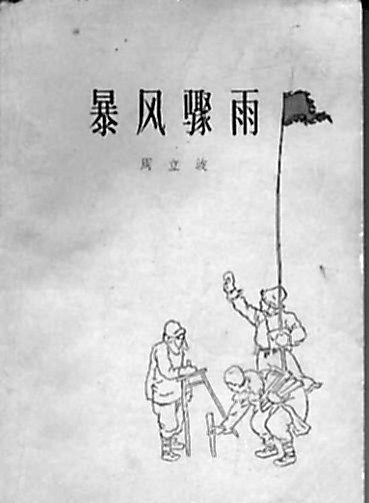
"The Tempest" is a novel by modern writer Zhou Libo, published by Northeast Bookstore in 1948.
"The Tempest" depicts the land reform team led by Xiao Xiang marching into Yuanmaotun on the banks of the Songhua River to mobilize and organize the vast number of poor peasants to carry out a struggle against the bully landlord Han Laoliu. After the execution of Han Laoliu, Han Laoliu's younger brother led the bandits into Tuntun and carried out a counter-offensive in an attempt to strangle the nascent regime. Under the successive leadership of Zhao Yulin, a communist party member, and Guo Quanhai, a young peasant, they defeated the sinister and cunning landlord Du Shanren. After that, Guo Quanhai signed up for the army and embarked on a new journey to liberate all of China.
With its majestic revolutionary momentum, distinct class love and hatred, and plump characters, "The Tempest" reproduces the stormy class struggle in Rural China during the Period of the New Democratic Revolution. This novel has distinct national characteristics, rigorous structure, exquisite characters, and language rich in local colors.
Creative background
After the victory of the War of Resistance Against Japan, in order to defend the fruits of victory, completely destroy the feudal forces in the countryside, and push the revolution forward, the Central Committee of the Communist Party of China issued the "May Fourth Directive" on May 4, 1946, which changed the rent reduction and interest reduction to confiscating the landlords' land and distributing it to the peasants. As a result, a vigorous agrarian reform movement was launched in the vast rural areas of the Liberated Areas.
In the winter of that year, Zhou Libo went to the northeast with his army and took part in the land reform struggle in the liberated areas of northeast China. He worked in Yuanbao Town, Shangzhi County, Songjiang Province. Songjiang Province is part of what is now Heilongjiang Province, and Yuanbao Town is Yuanmaotun in "The Tempest". During this period, it was the frozen and snowy season in the northeast, there were not many agricultural affairs, and Zhou Libo often nagged with poor farmers and listened to their unrestrained conversation. Topics range from struggles with landlords to family trivia, from customs to personal encounters... He worked in Yuanbao Town for half a year, fighting and working with the peasants every day, understanding the situation that he did not understand thoroughly in the usual years, learning a lot of knowledge, including the vivid language of the peasants in the northeast, and accumulating a relatively rich writing material.
In May 1947, Zhou Libo went to the Songjiang Provincial Party Committee to edit the Songjiang Farmers' Daily. His personal experience of the fiery struggle for land reform inspired him to write novels in his spare time. After he finished writing the first part, he took the first draft and went to Zhoujiagang in Wuchang County, Songjiang Province to supplement his life. Zhoujiagang is a relatively rich cantonment that has passed through the Japanese and merged villages, and the class struggle is complex and sharp, which is the focus of the provincial party committee's land reform work. Zhou Libo has lived here for four months. Later, he also visited some villages in Lalin and Weihe and Changling District in Hulan County, accumulating a large amount of living materials, further enriching and enriching the content of the work, he supplemented and revised the first part of the novel, and then spent more than half a year to complete the second part. "The Tempest" was written like this. In 1948, the Northeast Bookstore officially published the novel.
About the Author
Zhou Libo (1908-1979), formerly known as Zhou Shaoyi, pen name Libo. A native of Yiyang, Hunan Province. In 1928, he began his literary creation activities. In 1929, he published his debut essay "Buying Vegetables" in the "Declaration". In 1934, he joined the Chinese Left-Wing Writers' Union and at the same time joined the Communist Party of China, actively participating in the revolutionary literary activities led by the Party. When the War of Resistance Against Japanese Aggression broke out in 1937, Zhou Libo wrote a large number of prose reportage, which were later collected in two collections, "Impressions of the Jin-Cha-Ji Border Region" and "Battlefield Diaries".
In 1941, he began to write novels, during which time his major works were "Sparrow", "The First Night", "Akin's Illness", "Summer Night", "Memorial", "Cow", "Golden. Rings", etc. In 1944, he accompanied a southward detachment of the 359th Brigade of the Eighth Route Army to the rear of the enemy in South China, and experienced hardships and dangers with the soldiers of the unit. Based on this combat experience, he wrote "The Record of General Wang Zhen", "Comrade Wang Shoudao and Several Other Leaders", and "Impressions of General Li Xiannian" and then collected them into "Records of the South". In May 1947, he was transferred to the editor of Songjiang Farmer and began to conceive and create "The Tempest", and in October 1947 and December 1948, he completed the first and second volumes of "The Tempest".
"The Great Change in the Mountains and Countryside" manuscript fee list
Mr. Zhou Libo has contributed his strength to the motherland all his life, however, it is such a local writer who is loved by the people, but in 1979, unfortunately, he died of illness in Beijing. On the occasion of Mr. Zhou Libo's death, he made a will, in which he decided to donate all his assets to the country and contribute the last bit of strength to the progress and development of the country. After the death of Mr. Zhou Libo, Mr. Zhou Libo's wife endured grief, sorted out her husband's relics, and donated all of her husband Zhou Libo's life savings of eight hundred yuan to the state.